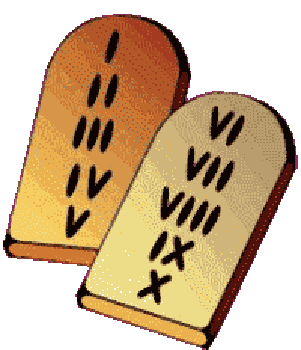December 16, 2005.
Whenever you show by Scripture that Christians are not bound by the Ten Commandments, someone is likely to object on the basis of Matt. 5:17 where Jesus said: “Think not that I am come to destroy the law, or the prophets: I am not come to destroy, but to fulfill.” Insight #142 received two such responses.
First of all, realize that “the law” in Matt. 5:17 clearly includes both the Ten Commands and other Old Testament commands. Six times Jesus begins new teachings with variations of “you have heard that it was said…” (verses 21, 27, 31, 33, 38, 43). The first two are quotes of the Ten. However, the other four are from other parts of the law. Thus, whatever Jesus meant by “not destroy,” must be applied both to the Ten and to the rest. Jesus said “the law.” There is no reason to limit “the law” to just ten commands.
Secondly, Jesus said He came “to fulfill.” What a claim! Who has ever fulfilled the law? “None of you keeps the law” (John 7:19). We must all admit: none of us has fulfilled the law. None? The Bible says, “He that loves another has fulfilled the law” (Rom. 13:8). Jesus always loved. He said: “I have loved you… Greater love has no man than this, that a man lay down his life for his friends” (John 15:9, 13). And lay it down He did. For you and for me. Jesus loved and loves us still. He has fulfilled the law.
Scripture says: “Jesus the Son of God… was in all points tempted like as we are, yet without sin” (Heb. 4:14-15). Jesus did what no adult in human flesh has ever done. He lived without sin. In all of human history, Jesus, and Jesus alone, fulfilled the law.
In the third place, Jesus also fulfilled the prophets. The Gospels often say such things as this: “That it might be fulfilled which was spoken by the prophets.” After his resurrection, Jesus told his apostles: “These are the words which I spoke unto you, while I was yet with you, that all things must be fulfilled which were written in the law of Moses, and in the prophets, and in the psalms, concerning me” (Luke 24:44). “All things”! Jesus was no failure. He fulfilled all that was written of Him in the prophets.
Summarizing the above, Jesus did not ignore the law, belittle it, or destroy it. Rather, He lived under the law, He kept the law, and He fulfilled the law! Nor did Jesus disregard the prophets or consider them of no value. Rather, Jesus confirmed the prophets by fulfilling them.
This prepares us for the verse following Matt. 5:17, where Jesus continued: “Till heaven and earth pass, one jot or one tittle shall in no wise pass from the law.” Many people stop reading right there. However, Jesus did not stop there. He added, “till all be fulfilled.” What a difference those four words make. Nothing would pass from the law — until all was fulfilled. Once fulfilled, it could be replaced with something far better.
Having fulfilled the law, Jesus is called “the end of the law” (Rom. 10:4). He is the end in two senses. The end (purpose) of the law was to prepare the way for Christ (Gal. 3:19, 24). The end (termination) of the law and the bringing in of a new testament came about through Christ’s death (Col. 2:14; Heb. 9:15-17). The law made nothing perfect; but Jesus perfectly kept the law, and died on the cross in order to make us perfect. Jesus fulfilled the law, and the prophets, for us. Having fulfilled them, they were replaced with His new Gospel.
